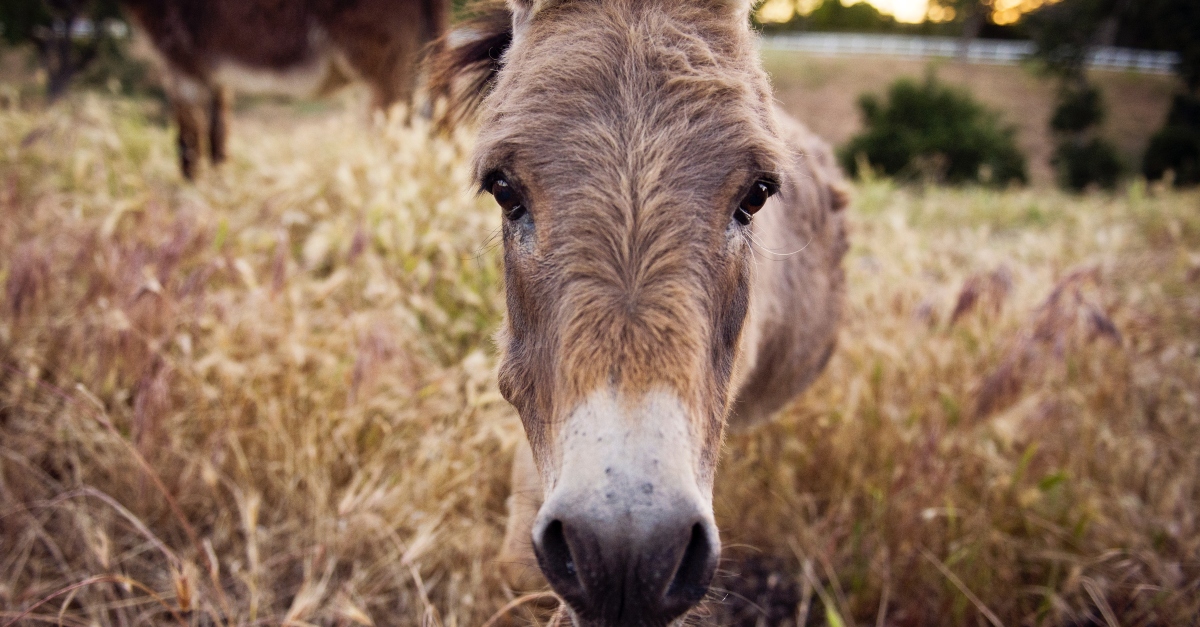3 Important Reminders from the Story of Balaam and His Talking Donkey
Share

The Bible records a plethora of inconceivable, but true, accounts. And the story of a talking donkey is in good company—along with a burning bush (Exodus 3:2) or gentle breeze (1 Kings 19:12)—as proof of the miraculous mouthpieces God can choose. In the story of Balaam, we find a man who professed obedience to the Lord, but grappled with a greedy heart. Let’s unpack the Bible story of Balaam and see what we can learn.
Who Was Balaam in the Bible?
The Bible tells us that Balaam was the son of Beor (Numbers 22:5), living in Pethor near the Euphrates River. Balaam was highly regarded by the Moabites and Midianites as a soothsayer (Joshua 13:22) and prophet (Numbers 24:2-9) who could bless or curse with his words. His brother, Bela, was a king of Edom.
Although Balaam lived among idolaters, he professed great knowledge of God. So, when the Israelites encroached on the plains of Moab, the king of the Moabites, Balak, summoned Balaam. He feared the Israelites would attack, and he wanted Balaam to put a curse on them.
Balaam is known as a powerful diviner, so Balak asks him:
“A people has come out of Egypt; they cover the face of the land and have settled next to me. Now come and put a curse on these people, because they are too powerful for me. Perhaps then I will be able to defeat them and drive them out of the land. For I know that whoever you bless is blessed, and whoever you curse is cursed”(Numbers 22:5-6).
Where Does Balaam Appear in the Bible?
You can read the portion of Balaam’s story that involves his donkey, in context, in Numbers 22. The saga, and Balaam’s ultimate demise, is recorded in the chapters that follow. But here in Numbers 22:12-20 we read that God tells Balaam not to put a curse on the Israelites because they are blessed.
Because of this, Balaam tells Balak’s officials that the Lord will not allow him to go with them. So Balak sweetens the offer, tempting Balaam with, “Do not let anything keep you from coming to me, because I will reward you handsomely and do whatever you say. Come and put a curse on these people for me” (Numbers 22:16-17).
Then Balaam, in what I believe is the revealing moment, goes back to God. He sees Balaam’s heart. It’s possible that God knew Balaam wanted the prize money more than God.
But God allows him to go, giving Balaam a second chance, but warning him to “do only what I tell you” (Numbers 2:20).
What Did Balaam Do?
Balaam rode his donkey along with the Moabites to go curse the Israelites. We don’t know why God was “angry when he went” (Number 20:22) but we can imagine God knows Balaam’s ways. To end Balaam’s willfulness, God sends an angel to block the path. But Balaam, intent on his assignment, doesn’t notice the angel. But the donkey does. Three times.
The first time, it causes the donkey to swerve away. And in an unsettling reveal of Balaam’s true nature, Balaam beats the frightened donkey back onto the path. The second time, the angel stands in a narrow path with walls on both sides. Again...Balaam exacts his frustration by beating the poor donkey. Finally, on the third account, the angel stands where “there is no room to turn, either to the right or the left” (Numbers 20:26).
The donkey is so frightened, it lays down, with Balaam still riding him. And how does Balaam behave? You guessed it. He beats the terrified animal who is already as low as he can get.
At this point, Scripture tells us the Lord opened the donkey’s mouth, and the donkey asks “What have I done to you to make you beat me these three times?” Outraged Balaam cries, “You have made a fool of me! If only I had a sword in my hand I would kill you right now” (Numbers 20:29).
It’s a display of pride and wickedness that twists your stomach. The donkey reasons, asking Balaam “Am I not your own donkey, which you have always ridden, to this day? Have I been in the habit of doing this to you?”
Then God opens Balaam’s eyes, and he sees the angel in the road, sword drawn. Only now does Balaam fall on his face in reverence.
The angel admonishes Balaam, asking why he beat his donkey heartlessly instead of realizing that his path was reckless. Now Balaam, a man who claims such devotion to God he can speak his very words, admits that he has sinned. He responds with “I did not realize you were standing in the road to oppose me. Now if you are displeased, I will go back” (Numbers 20:34).
Balaam does go back and stands by his conviction that he can only do what the Lord tells him to. And as it turns out in the ensuing chapters, the Lord will not allow Balaam to curse the Israelites.
In the eventual battle between Israel and the Midianites Balaam is killed while fighting on the side of Balak (Numbers 31:8).
Did Balaam's Donkey Really Talk?
The word of God is true, and the account of Balaam and the Moabites is historical record. Obviously we weren’t there to witness, but we know from Scripture that God can use anything he wants, to speak to us.
In this account, the voice of God comes through a donkey to convict Balaam of how his desire for prize money was blinding him, and separating him from the work God had called him toward.
Just as we believe the angel spoke to Mary about her immaculate conception, because Jesus was real in the flesh and rose from the dead, we can believe that Balaam’s donkey actually spoke.

Photo credit: Unsplash/Tim Mossholder
3 Lessons from Balaam's Story
1. God sees your heart, so heed his call.
This wayward bent of Balaam’s heart that continued in wickedness, is a telling tale of the inability to hide our hearts from God. Even in the New Testament, we still see the true character of Balaam recalled:
“They have left the straight way and wandered off to follow the way of Balaam son of Bezer, who loved the wages of wickedness. But he was rebuked for his wrongdoing by a donkey—an animal without speech—who spoke with a human voice and restrained the prophet’s madness” (2 Peter 2:15-1).
What we learn is to lean into Psalm 139’s example. Be in the healthy habit of asking God to search our hearts, see if there are any offensive ways, and lead us in the way everlasting.
2. Enticing others to sin will be the death of something.
Causing others to sin can sever relationships, especially with God. It’s true that Jesus gives us a way to repent and reconcile, but at the end of the story in Revelation, it’s clear what matters dearly to God about Balaam’s ongoing choices, even beyond his painful encounter with his donkey.
“Nevertheless, I have a few things against you: There are some among you who hold to the teaching of Balaam, who taught Balak to entice the Israelites to sin so that they ate food sacrificed to idols and committed sexual immorality” (Rev. 2:14).
And ultimately, when the Midianites and the Israelites went to battle, Balaam was slain while fighting on Balak’s side (Numbers 31:8).
3. God is in charge.
Let’s look at what is declared in Deuteronomy, after God holds his blessing on the Israelites firm...despite the desires of Balak and Balaam.
“No Ammonite or Moabite or any of their descendants may enter the assembly of the LORD, not even in the tenth generation. For they did not come to meet you with bread and water on your way when you came out of Egypt, and they hired Balaam son of Beor from Pethor in Aram Naharaim to pronounce a curse on you. However, the LORD your God would not listen to Balaam but turned the curse into a blessing for you, because the LORD your God loves you” (Deuteronomy 23:3-5).
God is love. And that love is fierce, almighty, all-knowing, and all good. Where he calls you, he will guide.
More like the gentle donkey, and less like Balaam, let’s seek God’s voice and follow it. When others tempt you to curse or harm others, even if great reward is offered, consider the reward you already have in Jesus. Run your thoughts through his teachings, and make your choices based on the voice that is trustworthy.
Further Reading
Who Were Balaam and His Talking Donkey in the Bible?
Photo credit: ©Getty Images Plus/Diy13
Lia Girard is a seasoned writer and voice artist who formerly served as the Faith Editor for Crosswalk.com. She is the author of Wisdom at Wit’s End: Abandoning Supermom Myths in Search of Supernatural Peace, and enjoys spending time with her husband and grown children or walking in the woods with God.